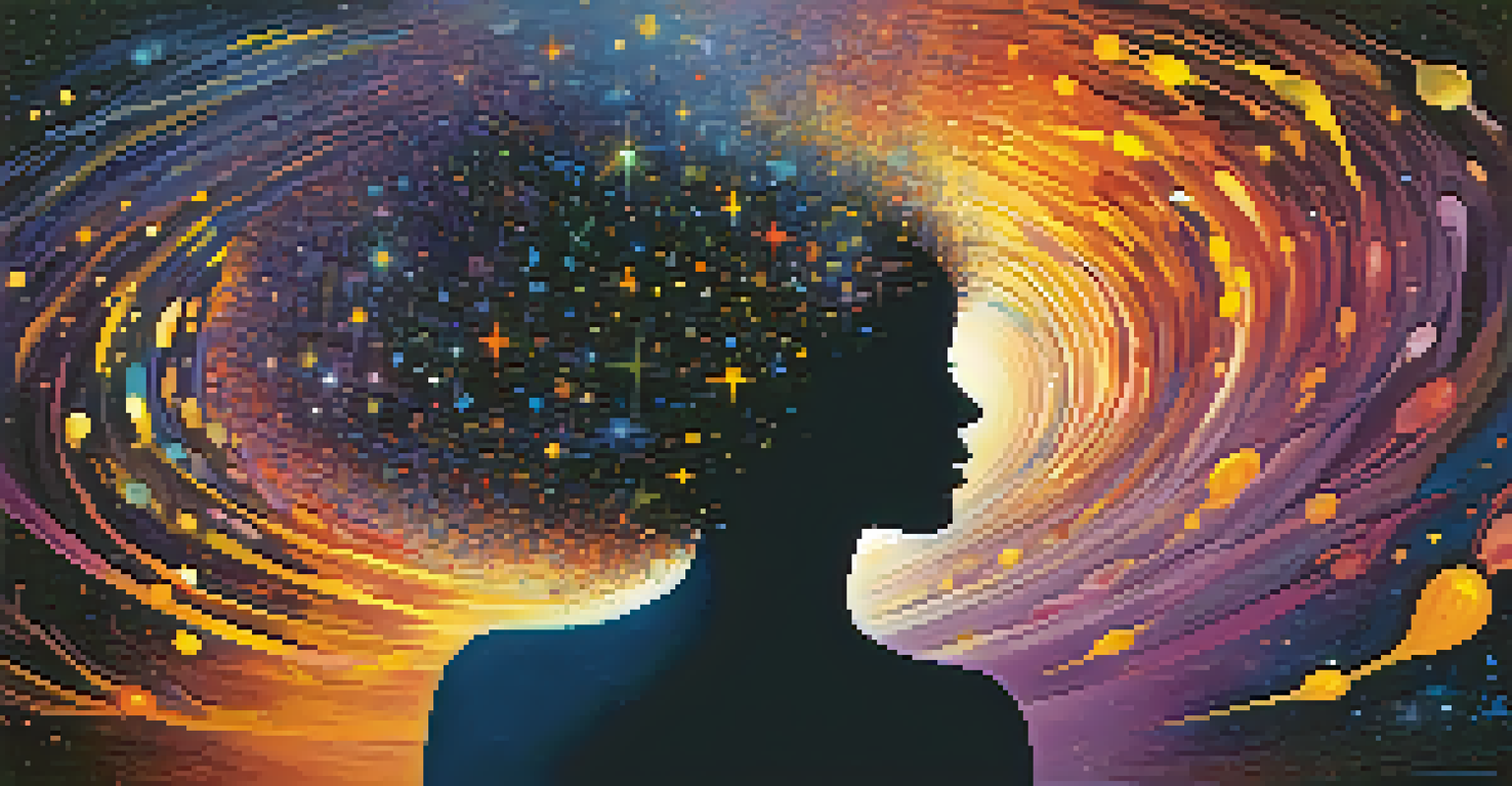Existential Psychology Through the Lens of Hallucinogenic Use

Understanding Existential Psychology: A Brief Overview
Existential psychology is a branch of psychology that focuses on the human experience, emphasizing concepts like meaning, freedom, and the nature of existence. It explores how individuals confront life’s fundamental questions, such as 'Why are we here?' and 'What is my purpose?'. This field encourages self-discovery and personal responsibility, fostering a deeper connection with oneself.
We are all in the gutter, but some of us are looking at the stars.
By examining the beliefs, emotions, and choices that shape our lives, existential psychology helps individuals navigate feelings of anxiety, isolation, and meaninglessness. The goal is to empower people to lead authentic lives, making deliberate choices that resonate with their true selves. This approach is particularly relevant in today’s fast-paced world, where many grapple with existential dilemmas.
Incorporating elements from philosophy and other disciplines, existential psychology aims to create a holistic understanding of human behavior. It underscores the importance of embracing uncertainty and finding personal significance, paving the way for profound personal growth and existential fulfillment.
The Role of Hallucinogens in Psychological Exploration
Hallucinogenic substances, often called psychedelics, have been used for centuries in various cultural and spiritual practices. They can induce altered states of consciousness, leading to profound changes in perception, thought, and emotion. This unique experience can facilitate deep introspection and self-reflection, aligning well with the goals of existential psychology.

Research suggests that psychedelics can help individuals confront their fears and anxieties, often providing insights into their existential concerns. Many users report experiencing feelings of interconnectedness, enhanced creativity, and a renewed sense of purpose following a psychedelic experience. These effects can lead to breakthroughs in understanding oneself and the world around them.
Existential Psychology Explored
Existential psychology emphasizes self-discovery and personal responsibility by addressing fundamental life questions.
However, the use of hallucinogens is not without risks and should be approached with caution. It’s essential to consider set (mindset) and setting (environment) when exploring these substances, as they can significantly influence the experience. Many practitioners advocate for guided or therapeutic use to maximize benefits while minimizing potential negative effects.
Intersecting Existential Thought and Psychedelic Experiences
The intersection of existential psychology and psychedelic use offers a rich ground for exploration. During psychedelic experiences, individuals often confront deep-seated fears and questions about existence, leading to transformative insights. This process parallels the goals of existential psychology, which seeks to foster understanding and acceptance of life's complexities.
The unexamined life is not worth living.
Many people report that psychedelics help them explore themes of mortality, purpose, and identity. For instance, a person grappling with the fear of death may find that a psychedelic experience fosters acceptance and opens up conversations about life’s transience. This can lead to a more profound appreciation for life and a commitment to living authentically.
Moreover, the insights gained from these experiences can have lasting impacts, encouraging individuals to pursue meaningful paths in their lives. By blending existential thought with the unique experiences offered by psychedelics, individuals can embark on a journey of profound self-discovery and personal growth.
Psychedelics and the Search for Meaning
A fundamental aspect of existential psychology is the search for meaning in life. Many individuals encounter feelings of emptiness or disconnection, prompting them to seek out experiences that can provide clarity. Psychedelics have been reported to facilitate this search by enabling people to experience life from new perspectives and question their existence's significance.
For example, during a psychedelic journey, someone may find themselves reflecting on their relationships, career choices, or personal values. This introspective journey can reveal previously unrecognized patterns and beliefs that influence their life. Such revelations can lead to a more authentic and purpose-driven existence.
Psychedelics Enhance Self-Exploration
Hallucinogens can facilitate deep introspection, helping individuals confront fears and gain insights into their existence.
While the search for meaning can be challenging, psychedelics may act as catalysts for this exploration. By breaking down mental barriers and fostering openness, these substances can help individuals identify what truly matters in their lives, ultimately guiding them toward a more fulfilling life trajectory.
Therapeutic Applications of Psychedelics in Existential Issues
In recent years, there has been a resurgence of interest in the therapeutic potential of psychedelics, particularly in treating existential issues. Clinical studies have shown promising results in using psychedelics to help individuals facing terminal illness, depression, and anxiety related to life’s fundamental questions. These substances can facilitate meaningful conversations about death, purpose, and the human experience.
Therapists often use guided psychedelic sessions to help patients confront their fears and anxieties head-on, leading to transformative insights. For many, this process can alleviate feelings of isolation and despair, fostering a sense of connection to themselves and the universe. The therapeutic setting provides a safe space for exploring these deep existential concerns.
While the field is still evolving, early findings suggest that psychedelics could be game-changers in existential therapy. By addressing the root causes of suffering and encouraging personal exploration, these substances could unlock new pathways for healing and understanding.
Cultural Perspectives on Psychedelics and Existence
Throughout history, various cultures have utilized psychedelics in spiritual and ritualistic contexts, viewing them as tools for understanding existence. Indigenous communities, for instance, often incorporate these substances into their traditions, seeing them as a means to connect with nature, ancestors, and the cosmos. This cultural perspective highlights the profound relationship between psychedelics and existential exploration.
In contemporary society, the narrative around psychedelics is shifting, with increasing acceptance of their potential for personal and spiritual growth. As more people share their experiences, these substances are gaining recognition not just for recreational use but also for their ability to foster deep existential insights. This cultural shift encourages a broader discussion about the meaning of life and our place within it.
Cultural Views on Psychedelic Use
Various cultures have historically utilized psychedelics as tools for spiritual exploration, highlighting their potential for personal growth.
By examining these cultural contexts, we can better understand the transformative potential of psychedelics. They serve as reminders of the universal quest for meaning, urging us to explore our own beliefs, values, and connections to the world around us.
Navigating the Future of Existential Psychology and Psychedelics
As research into psychedelics expands, the future of existential psychology may be significantly influenced by these findings. With growing interest in mental health and well-being, more individuals are seeking alternative methods to explore their existence. The potential for psychedelics to facilitate profound self-discovery and healing makes them a compelling avenue for future exploration.
However, it is crucial to approach this field with caution and responsibility. Continued research and open dialogue about the risks, benefits, and ethical considerations surrounding psychedelic use are essential. As we navigate this complex terrain, we must prioritize safety and informed consent, ensuring individuals have access to the support they need.

Ultimately, the integration of psychedelics into existential psychology could reshape how we understand and approach the human experience. By embracing this evolving landscape, we open up new possibilities for healing, growth, and connection in our quest for meaning.